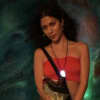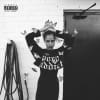 On overcast days city parks can feel foreboding, as if someone nearby is about to be bludgeoned, or the partially decomposed remains of a body are about to be discovered by an amateur birdwatcher. This is especially true of Elysian Park in Los Angeles, where the sparsely populated public lots are the workweek hang for people with something to hide (adulterers, burners, persons of interest, lurkers of unknown origin and purpose), and the vehicles passing through all seem like possible subjects of a recent freeway Amber Alert. But it’s also lush and beautiful, and close to the Chinatown home/studio of Daniel Pineda and Asma Maroof from Nguzunguzu, who suggested the park as backdrop for talking about Time’s Up, their liberated, percussively forward new EP of club music. As usual, the DJ/production team goes for big atmosphere.
On overcast days city parks can feel foreboding, as if someone nearby is about to be bludgeoned, or the partially decomposed remains of a body are about to be discovered by an amateur birdwatcher. This is especially true of Elysian Park in Los Angeles, where the sparsely populated public lots are the workweek hang for people with something to hide (adulterers, burners, persons of interest, lurkers of unknown origin and purpose), and the vehicles passing through all seem like possible subjects of a recent freeway Amber Alert. But it’s also lush and beautiful, and close to the Chinatown home/studio of Daniel Pineda and Asma Maroof from Nguzunguzu, who suggested the park as backdrop for talking about Time’s Up, their liberated, percussively forward new EP of club music. As usual, the DJ/production team goes for big atmosphere.
The new record is the first release off the Fade to Mind label, which pools the collective talent of Nguzunguzu and frequent collaborators Kingdom and Total Freedom and serves as a sister label to Night Slugs, the UK’s dance music label du jour. “When people ask us what our sound is like, we say we’re calling it ‘sad sexy scary,’” says Maroof, whose CV includes stints as MIA’s tour DJ. “Those are the elements, that’s what we coined all together. It’s cool, because there’s not that many independent electronic American labels doing what we’re doing.” For Time’s Up, that means deploying a riveting mix of heavy toms, thick bass and chimes. There’s a crunky track and another that riffs on Venezuelan raptor house beats. In the past, Nguzunguzu has warmed up their feisty futuristic menace with global dance music elements, perfecting a sound that’s like space-fights with bubble guns and makes falling down the stairs seem like fun.
Maybe the groovy-alien-from-the-future thing isn’t what you’d expect from two children raised in the respective American flatlands of Oklahoma City and Bowie, Maryland, but Maroof credits Bowie’s geography with giving her an early musical education. “I heard Baltimore club on the radio, then I heard go-go music from DC, the best hip-hop and R&B. 92Q, 93.9, 95.5—I love the radio there,” she says. Pineda grew up in Oklahoma City, immersed in the suburban language of skateboarding and punk rock. “It was not that exciting musically, or culturally in general. I was really anxious to leave,” he says. The pair connected at the Art Institute of Chicago, and struck up an artistic (and yeah, romantic) epistolary courtship after Pineda moved to California, sending music back and forth. “I was still in school and he told me to take this improvisation class,” says Maroof. “I didn’t make music before that, I was always really shy, but that kind of got me going and inspired me to get a keyboard.” During visits, they’d mess around with keyboards and Pineda’s MPC, eventually recording their experiments and passing them around to friends. “It was never like, ‘Let’s start a band!’ or anything. It was just an interest in what happens when you improv and just make music with no inhibitions or any idea for what it should be,” she says. Their musical symbiosis translates in person, where the pair finishes each other’s sentences, cracks each other up and generally has each other’s back.
Since those first homespun recordings, Nguzunguzu has gained notoriety for their (now defunct) Wildness parties in LA, as well as their remixes of artists like Ciara and Ratatat. After touring with Gang Gang Dance and playing MoMA PS 1 this summer, they hope to set up another regular party in LA. But no spotlights, please. “I just want to be in a dark corner with no lights on us, just lots of lasers and fog,” says Pineda. “There’s not that much to look at. Just dance.”


